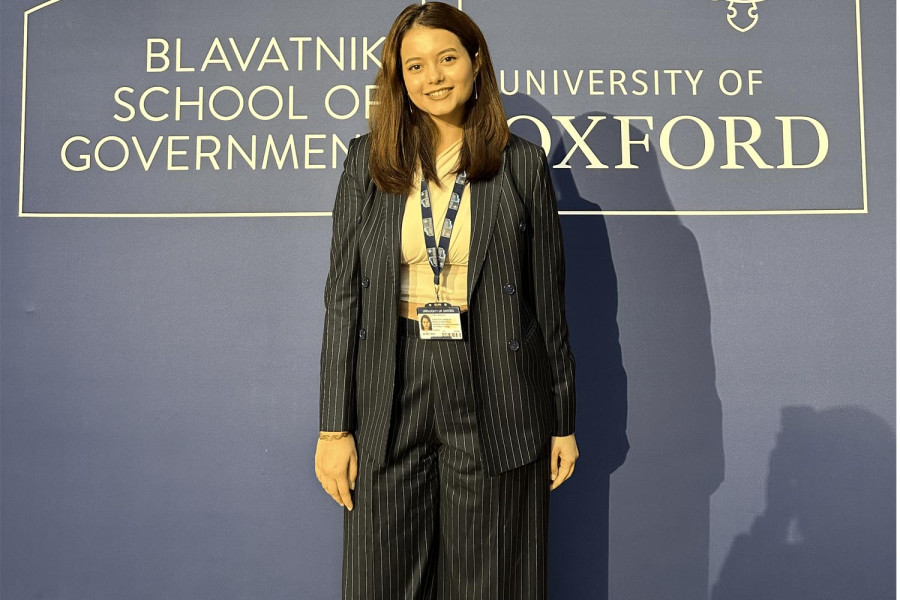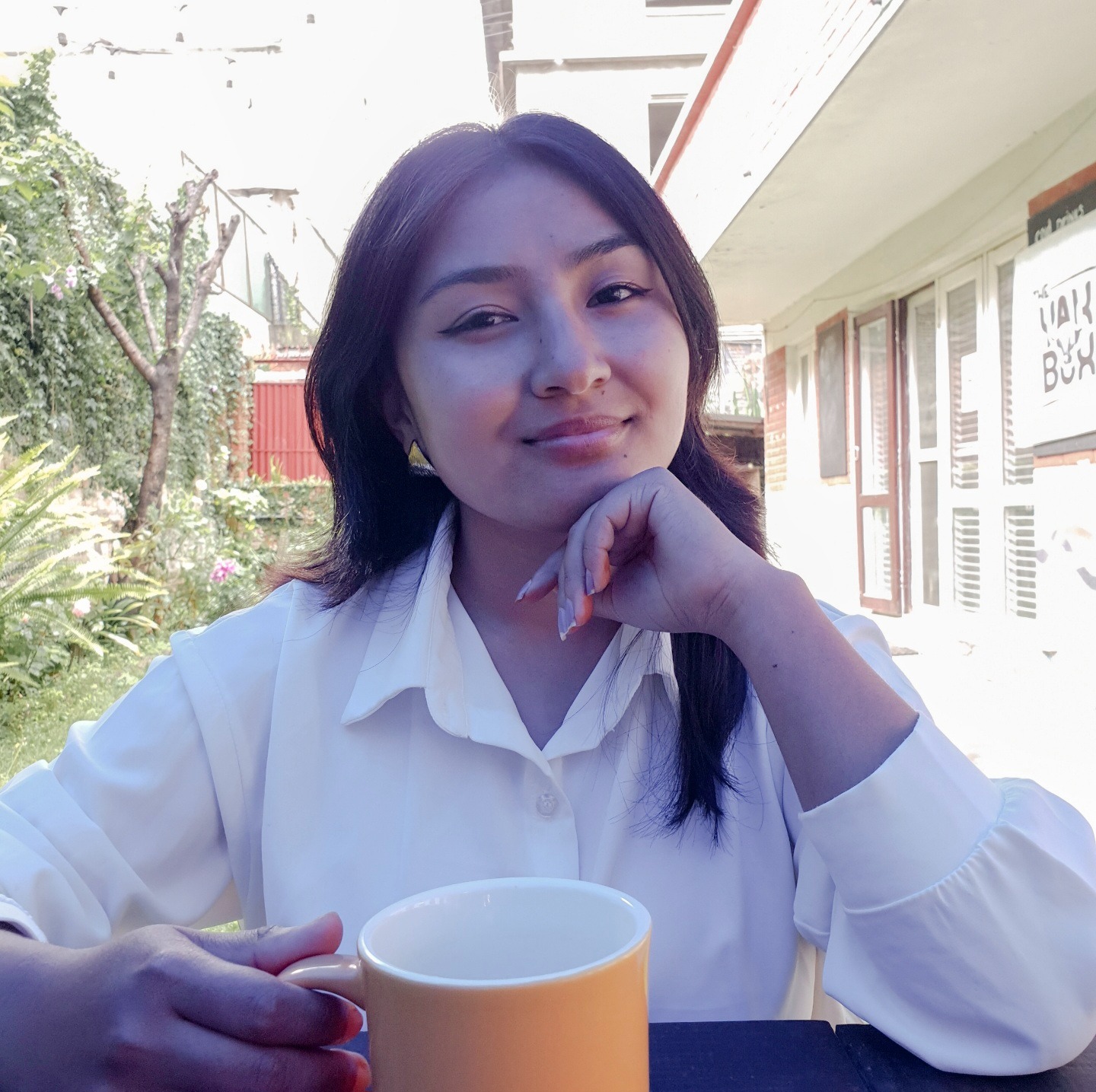Books
Books shape my opinions and decisions
Prakriti Bhattarai Basnet, a Master of Public Policy candidate at the University of Oxford and a teaching fellow at the Harvard Kennedy School, discusses reading and her love for Dostoevsky’s works.
Timila Maharjan
Prakriti Bhattarai Basnet is a Master of Public Policy (MPP) candidate at the University of Oxford interested in the Digital Transformation of Governments, Cybersecurity, and Statecraft. She is a research assistant at the Blavatnik School of Government (one of the University of Oxford’s newest departments), which focuses on strengthening democracy by addressing threats to women in politics.
Basnet is also a teaching fellow at the Harvard Kennedy School’s executive education program LSA-Public Narrative: Leadership, Storytelling, and Acton.
In this conversation with the Post’s Timila Maharjan, Basnet discusses books that have helped her grow personally and professionally.
How did you get into reading?
My mother used to offer facials for women, going from house to house. At one of her clients' homes, she noticed that the daughter, who was around my age and attended St Mary's School, was always studying thick books. After discovering that these books were helpful for children's development, my mother started borrowing them for me. This sparked my love for books, but ‘Chicken Soup for the Soul’ ignited my passion for reading. Although access to those books was limited, I was captivated by the children's magazine ‘Muna’ and eagerly read every letter in ‘Kopila’.
What kind of genre do you usually prefer?
Choosing between genres is like choosing between my father and mother—I simply can’t. I enjoy reading all genres because each one stimulates the mind and soul in its unique way. Five years ago, I would have said non-fiction was my favourite, but now I believe reading should primarily be about enjoyment. In fiction, I have a particular fondness for dystopian novels. Recently, I’ve also been exploring Russian literature. This year, I read three of Dostoevsky’s works, and they have challenged my views on morality. I’ve hesitated to pick up another one because of how much they've shaken my beliefs. My growing interest in dystopian novels and Dostoevsky stems from how they help me reflect on my moral compass and question my beliefs.
How has reading contributed to your personal and professional development?
Every book I’ve read has left an imprint on me—some subtle, like a light trace on the sand, and others more significant, like a lasting scar—every opinion I hold or decision has been shaped by one book or another. On a personal level, reading has made me more empathetic and patient. Professionally, it has enriched my vocabulary and offered new perspectives for tackling challenges.
Where do you prefer to read books, and why?
I can’t read books anywhere else but at home. I don’t know where my home is because I have been moving around, but I prefer to read alone.
Which book left an impression on you? And how has it influenced you?
‘The Brothers Karamazov’ by Dostoevsky has affected me. I found reflections of myself in Alyosha, Ivan, and Dmitri—some aspects I utterly related to, while others were parts of myself I was hesitant to face. The struggle between good and evil, intertwined with themes of justice and forgiveness, made me confront my imperfections. It has even changed how I listen to others. The book has made me more like Alyosha, constantly seeking to understand what lies beneath the surface.
Apart from reading, do you also enjoy writing?
I experience imposter syndrome when it comes to writing. I create pieces but never share them. Although I want to pursue writing, I often feel that my work isn’t genuine and feels hypocritical. I need to learn to be honest about my emotions before writing.
During lockdown, you went live on Instagram and read books to your followers. Why did you do that?
If I’m being honest, it started because I was struggling with my sleep schedule. I saw many friends going through the same thing and thought, ‘Let's have a little story-time thing on Instagram before going to bed.’ We also wanted to raise awareness about some fantastic Nepali literature.
Have your reading habits evolved since starting your studies at Oxford? Has it changed your approach to books?
I haven’t had much time to read besides academic books and papers. Since arriving here and spending time with my friends, I’ve noticed that my ability to focus for long periods has improved significantly. It’s amusing how I expected to gravitate more towards non-fiction after coming here, but the people I’ve met have encouraged me to return to fiction. Their ability to quote Shakespeare, Austen, and Tolstoy during intense policy debates has inspired me.
Have you encountered books that have changed your perspective on governance or public policy?
Three books that I consumed and that transformed my perspective on policies are ‘Nudge: Improving Decisions about Health, Wealth, and Happiness’ by Richard H Thaler and Cass R Sunstein, ‘The Tragedy of Great Power Politics’ by John Mearsheimer, and ‘Governing the Commons: The Evolution of Institutions for Collective Action’ by Elinor Ostrom. I highly recommend ‘Nudge’ to everyone, as it uses behavioural economics to influence public policy, promoting small policy changes that can lead to significant improvements.
Is there a book that everyone in public policy or leadership should read?
Deborah Stone's ‘Policy Paradox: The Art of Political Decision Making’ highlights that policymaking is far more complex and nuanced than many realise. The book explains that policy decisions are not solely based on rationality but are influenced by various values that policymakers have consciously and unconsciously adopted.
Are there any authors whose work resonates with your mission and values?
I appreciate James C Scott’s work in ‘Seeing Like a State’. The book’s insights into large-scale project failures highlight the significance of local knowledge. I connect with this idea because urbanisation has often diminished the unique character of cities, and Scott’s book deepened my understanding of what it means to “see like a state.”
Regarding Niccolò Machiavelli, people tend to be divided into two camps: those who admire him and those who think he could have benefited from therapy. Regardless, ‘The Prince’ offers valuable lessons in pragmatic governance.
Which book are you currently reading? And why?
I just submitted my final report, so I am reading something light. It’s called ‘Yellowface’ by RF Kuang. It’s straightforward but eccentric.
Prakriti Bhattarai Basnet's five book recommendations
Nudge
Author: Richard H Thaler and Cass R Sunstein
Publisher: Yale University Press
Year: 2008
This book outlines how small nudges in policymaking can lead to subtle shifts that enable better decision-making.
Crime and Punishment
Author: Fyodor Dostoevsky
Publisher: The Russian Messenger
Year: 1866
Dostoevsky’s novel encourages self-reflection on morality, guilt, and redemption while exploring the internal conflicts of the human heart.
Chirharan
Author: Neelam Karki Niharika
Publisher: Sangri~la Books
Year: 2016
It provides a glimpse into the lives of mythical characters through a feminist lens, highlighting their experiences and struggles.
Deep Work
Author: Cal Newport
Publisher: Grand Central Publishing
Year: 2016
Young people struggling with popcorn brain syndrome should read this book to recognise the impact of reduced attention spans.
Quiet
Author: Susan Cain
Publisher: Crown
Year: 2012
Cain’s book is for extroverts who secretly long for introversion, offering validation for those who balance both identities.




 13.12°C Kathmandu
13.12°C Kathmandu














